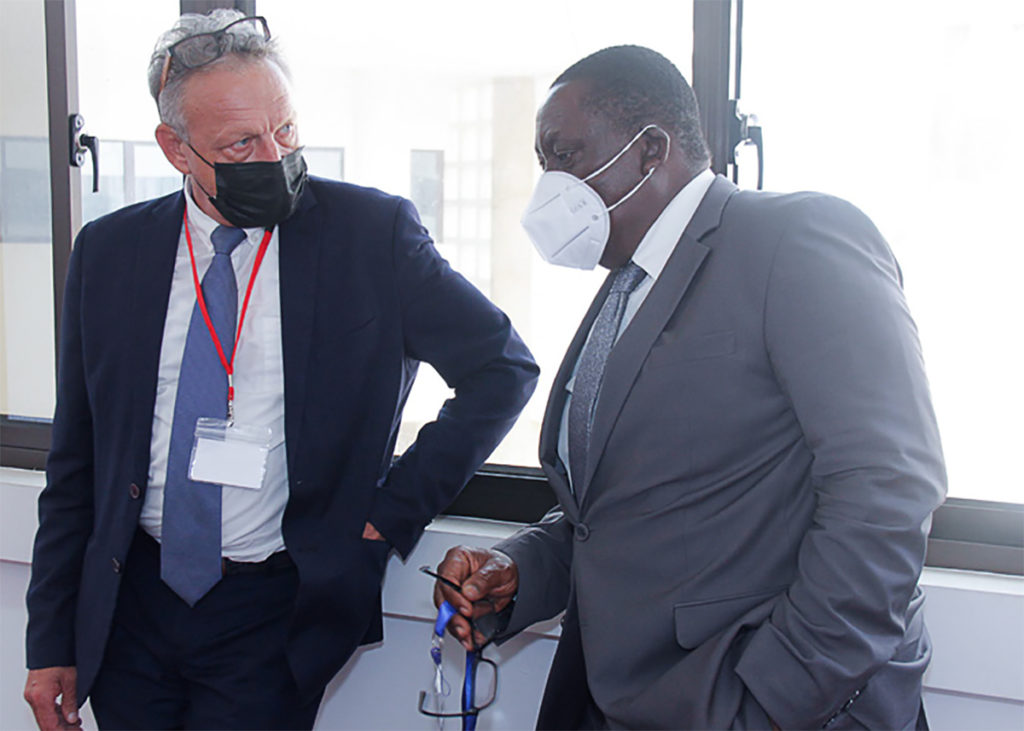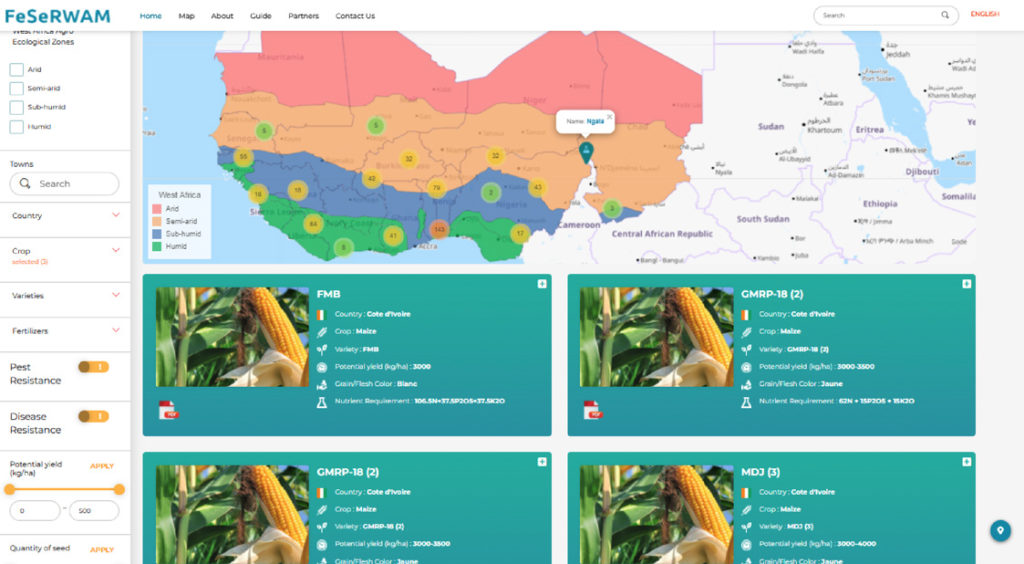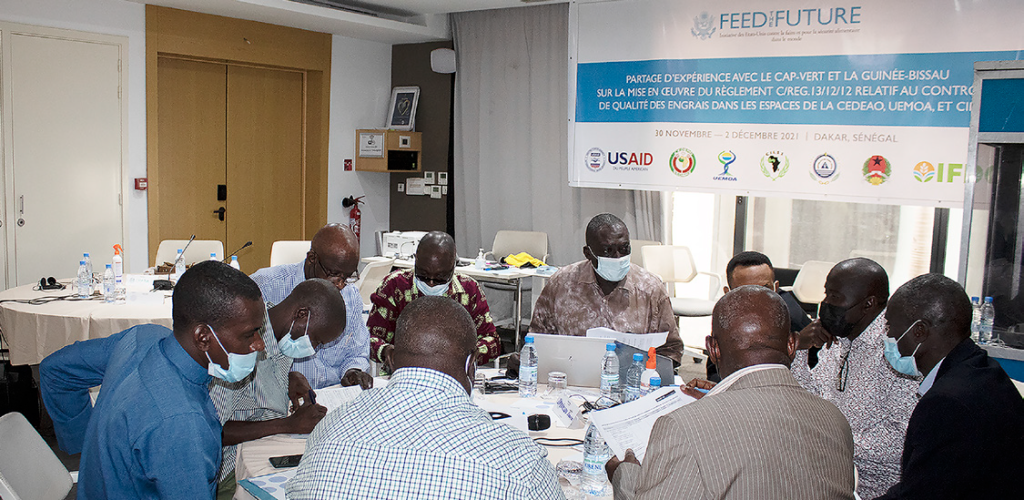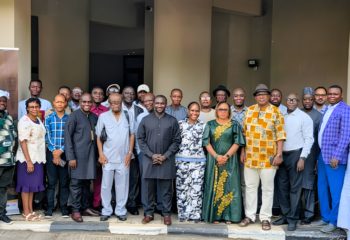
Contents
EXPERTS, INCLUDING EnGRAIS, ASSEMBLE TO ADDRESS FERTILIZER CHALLENGES IN WAEMU MEMBER STATES

When surging fertilizer prices compelled the West Africa Economic and Monetary Union (WAEMU) to assemble experts and key stakeholders to discuss and find solutions, the Feed the Future Enhancing Growth through Agricultural Input Systems (EnGRAIS) project for West Africa was also invited as a key technical expert to provide input and guidance.
The meeting aimed to identify ways of improving access to chemical fertilizer for farmers within the WAEMU region. Specifically, the experts were tasked to examine fertilizer needs for the 2021–2022 agriculture season in the 8 WAEMU countries and analyze measures to secure supplies and facilitate access to the product for farmers.
Being a key fertilizer industry actor in the region, EnGRAIS and its partner, Africafertilizer.org, assisted their national counterparts in the Ministries of Agriculture across the region, ahead of the crucial consultative meeting, to prepare country situation statements on fertilizer prices; current use and forecasted demand; as well as inventories, that were requested and critical for the conference.
In addition, EnGRAIS prepared a consolidated analysis of the fertilizer situation in the region and presented same through its Private Sector Expert, Patrice Annequin, to the Agriculture Ministers present. Supporting the presentation with documentation, EnGRAIS distributed hard copies of several EnGRAIS publications, including the latest editions of the West Africa Fertilizer Subsidy Program Matrix, the West Africa Fertilizer Business Guide (WAFBIG), and the Regional Fertilizer Subsidy Program Guide (RFSPG).
Main recommendations from the expert group and the final ministerial communique, which largely echo those made by the West Africa Fertilizer Association (WAFA) and EnGRAIS in Lomé earlier, and are in line with the RFSPG, were as follows:
- Take measures to secure the supply of fertilizers for food crops, the needs of which are estimated at nearly 1.2 million tons and award the fertilizer supply contracts by 15 January 2022 latest.
- Facilitate access to finance for fertilizer imports, and prospect with financial institutions the possibility of supporting private stakeholders to mobilize financing and/or emergency funds to support supply.
- Remove all taxes on fertilizers, and clear arrears of debts to fertilizer suppliers where they exist.
- Strengthen fertilizer subsidy programs, and emphasize food crops.
- Better target the beneficiaries of the subsidy programs to increase their effectiveness.
- Strengthen the system for monitoring the quality of fertilizers in Member States.
EnGRAIS will continue to support ECOWAS and UEMOA, and the member states, to monitor and inform policy makers and private stakeholders on the current and forecasted market conditions, to provide advice along the lines of the Regional Subsidy Guide to ensure supplies of quality products to farmers for this campaign.
EnGRAIS AND PAIRED STRENGTHEN NARS AND PRIVATE SECTOR CAPACITY TO MASTER AND UPDATE FeSeRWAM AND AIPS

EnGRAIS and its collaborator, the Partnership for Agricultural Research, Education and Development (PAIRED) project, trained over 40 key stakeholders, including public, private, and civil society organizations, in a regional workshop in Abidjan, Côte d’Ivoire December 6–10, 2021, to master the use of the Fertilizer and Seed Recommendations Map for West Africa (FeSeRWAM) platform and update their respective country Agro-Input Packages (AIPs) co-developed by the EnGRAIS and PAIRED projects.
IFDC and CORAF technical teams benefited from the training, as well as country focal points or representatives, who will oversee updating exercises of country AIPs in their respective countries including Benin, Burkina Faso, Côte d’Ivoire, Ghana, Nigeria, Niger, Mali, Senegal, and a regional organization, PR-PICA, ROPPA as well as WAFA, representing the regional fertilizer private sector.
With the help of the FeSeRWAM platform developer and its team, participants received skills to use the platform and update AIPs on their own, and reviewed, revised, and cleaned up the AIPs and the platform after going through the skills training.
As a result of the concerns and suggestions raised during presentations and practical sections, a technical meeting was organized among IFDC, CORAF technical teams and the developer of the platform, ImageAD, to address the issues and concerns raised.
At the end of the training, participants developed a comprehensive roadmap to help review and revise during the 3 coming months the AIPs and the platform based on concerns raised during discussions at the five-day exercise.
A technical team was put in place to supervise the revisions to finalize all country AIPs and the FeSeRWAM platform in view of a public release by June 2022. Country focal points and representatives agreed to continue updating their respective country-level AIPs to keep the data up to date – which today reach a total of 500 AIPs covering 16 crops in 11 countries.

Promoting Implementation of the ECOWAS Regulation on Fertilizer Quality: EnGRAIS Facilitates Experience-Sharing

Between November 30 and December 2, 2021, EnGRAIS created a platform for Cape Verde and Guinea Bissau, in a two-country workshop in Dakar, Senegal, to share experiences and best practices on conditions and modalities for effective implementation of the regionally harmonized Regulation C/REG.13/12/12 relating to fertilizer quality control in the ECOWAS region. This follows the publication of the Regulation in the Official Gazettes of both countries on December 18, 2020, and September 20, 2020, respectively.
Together, a total of 28 participants including ten delegates from each targeted country attended the workshop in addition to resource persons invited from Ministries of Agriculture of Burkina Faso and Niger, because both countries have made significant progress and implementing and enforcing regional regulations at national level and could share experiences with Cape Verde and Guinea Bissau. The presence of Burkina Faso and Niger resource persons as well as the EnGRAIS Policy Expert enabled participants to share and discuss lessons learned and good implementation practices.
The EnGRAIS Policy Expert led participants to discuss the level of progress achieved by the different ECOWAS, WAEMU and CILSS Member States, with a focus on addressing main obstacles to implementation. Leaders of the two country teams also led participants to discuss status of implementation of the Regulation in their respective countries. While in the task groups and learning from identified shortcomings faced by other countries, they further arranged to identify strategies to surmount some of these problems.
To facilitate the process of development and adoption of the texts, the Cape Verde team, for instance, recommended:

- An analysis of the application texts of the ECOWAS Regulation in other countries of the community which are more advanced in view of its adaptation and introduction into the green legal framework. EnGRAIS provided to both teams country text models at the end of the workshop.
- The creation of a fertilizer advisory body to the General Directorate for Agriculture, Forests and Livestock (DGASP).
- A Capacity building program of the DGASP team for fertilizer inspection and quality control.
- The availability, by EnGRAIS of the ECOWAS Fertilizer Inspection and Analysis Manuals as well as key documents in Portuguese version.
- The provision of EnGRAIS’s support and technical assistance to Cape Verde for the training of fertilizer inspectors.
Based on the status, the following major recommendations were made to Cape Verde and Guinea Bissau to facilitate and accelerate the implementation of activities proposed in the roadmaps by:
- Advocating for increased political will and adequate allocation of resources for a successful and sustainable implementation of the regulations.
- Establishing inclusive implementation processes beginning from the drafting of complementary country specific supporting regulations; and
- Informing/sensitizing all actors for a better knowledge and application of the regulations.
PROMOTING HARMONIZED ECOWAS REGULATION FOR QUALITY FERTILIZERS IN WEST AFRICA: EnGRAIS AND REGIONAL INTERGOVERNMENTAL ORGANIZATIONS WORK TO ACCELERATE IMPLEMENTATION

The fertilizer sector in West Africa continues to experience problems with fertilizer quality, making it difficult for farmers to get the maximum return on their investments. Although the regional economic communities have addressed this problem, they need additional support and solutions to coordinate and strengthen the implementation of the ECOWAS Regulation C/REG.13/12/12 adopted in 2012, on fertilizer quality control in the 17 West African and Sahelian states, so that farmers across the region can obtain and use quality fertilizer to increase their productivity and improve their livelihoods.
Although the regulation is effective, its implementation at the national level has faced various technical and legal challenges that require concerted and sustained efforts in several countries in the region.
Through joint missions conducted in December 2021 with the three regional intergovernmental organizations (the Economic Community of West African States (ECOWAS), the West African Economic and Monetary Union (WAEMU), and the Permanent Inter-State Committee for Drought Control in the Sahel, the Feed the Future Enhancing Growth through Regional Agricultural Input Systems (EnGRAIS) project for West Africa brought together key stakeholders, including the Ministers of Agriculture of Senegal and Côte d’Ivoire, Hon. Moussa Balde and Kobenan Kouassi Adjoumani, respectively, to commit to accelerate the implementation of this community regulation.

In Dakar and Abidjan, the missions and the technical teams from the ministries analyzed the processes of aligning the national complementary texts with the harmonized regional provisions, identified the challenges related to this process, updated the detailed roadmaps previously developed in the two countries, and received the firm support of the ministers to consider the signing of the current drafts of country-specific regulations setting out the modalities of application of the regulation and the associated implementing texts, no later than April 2022.
“Meeting with strategic stakeholders, including two West African Ministers of Agriculture, and obtaining their collaboration
and support for the signing of a series of country-specific complementary regulations, decrees and orders to facilitate the implementation of the harmonized regional fertilizer regulations in their respective countries, is an excellent opportunity to advance efforts towards a broader implementation of C/REG.13 /12/12 in the region,” said Luisa Maria Kalmongo, agricultural expert at the WAEMU Directorate of Agriculture.
EnGRAIS continues to provide technical support to promote quality fertilizers throughout the region for millions of farmers to increase their production and productivity and promote food security throughout West Africa.
PLANNED KEY ACTIVITIES FOR NEXT QUARTER (JANUARY–MARCH 2022)
- Assist WAFA to prepare a virtual or face to face Annual General Meeting, if COVID 19 conditions permit.
- Contribute to the preparation and participate in the Afriqom West Africa Fertilizer Club in Abidjan (March 9-11).
- Complete the Nigeria corridor cost build-up study, and hold a regional validation workshop for the seven corridors (including Dakar – Bamako; Abidjan–Bamako; Abidjan–Ouagadougou; Accra–Ouagadougou; Abidjan–Accra–Lomé–Cotonou–Lagos; Cotonou–Niamey; Lagos–Niamey.
- Run tests of the new Fertilizer Cost Simulator and release the public version.
- Publish the 2022 edition of the WAFBIG.
- Sign sub-grant with PR-PICA for AIP dissemination in seven countries and a second sub-grant with NARLS for the same exercise in Nigeria.
- Finalize discussions as well as develop and sign contract/ =sub-grant for AIPs dissemination in Benin, Burkina Faso, Cote d’Ivoire, Mali, Senegal, and Togo.
- Finalize AIPs review and production of booklets as well as training modules.
- Deploy updated FeSeRWAM online.
- Conduct in-depth country impact assessments of application of the “smart” guiding principles including those related to AIPs and value chain efficiency in Ghana and Burkina Faso.
- Finalize the regional draft laboratory capacity assessment report and action plan for capacity building.
- Finalize editing of the English version of the regional training manual on fertilizer inspection and quality assessments and translate it into French.
- Follow-up with the two-country experience sharing workshop for Cape Verde and Guinea-Bissau and joint ECOWAS/UEMOA/CILSS/IFDC missions to Cote d’Ivoire and Senegal.
- Deliver training programs for fertilizer inspectors in Niger, in collaboration with the PARSEN project.




